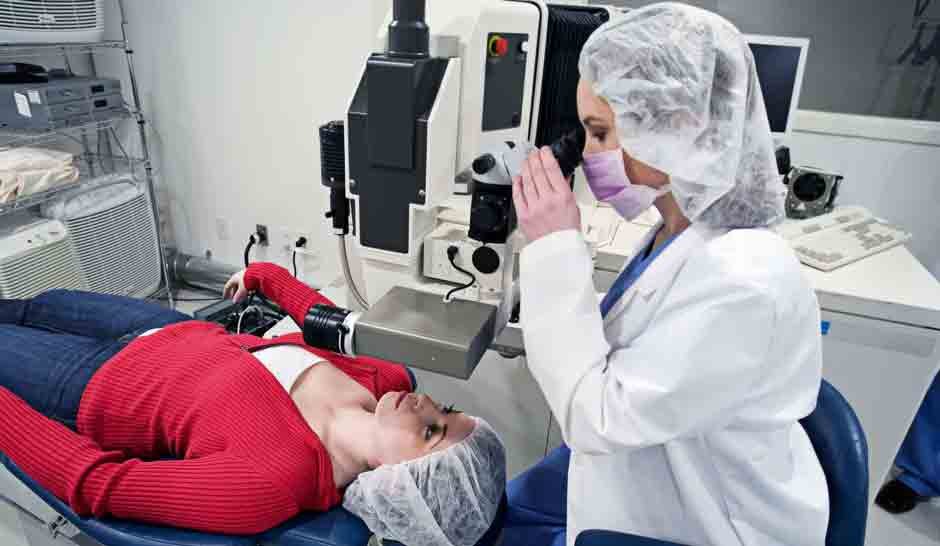Who Should Not Get Laser Eye Surgery?

Laser eye surgery is a popular and effective way to correct vision problems, but it does not suit everyone. The process has a few benefits as well as some risks. Here is more information about who should not get laser eye surgery and why:
What Does Laser Eye Surgery Entail?
Laser optic surgery, also known as refractive surgery, is a procedure that utilizes a laser to redesign the cornea of the eye, which is the clear outer surface of the eye. This helps to correct vision problems such as nearsightedness, farsightedness, and astigmatism.
During the procedure, the surgeon will use a computer-controlled laser to remove a small amount of tissue from the cornea. This reshapes the cornea, allowing light to focus more accurately on the retina, leading to improved vision. The procedure takes less than an hour and occurs on an outpatient basis.
People should consult with only the best laser eye surgeon before undergoing laser optic surgery to ensure the procedure is safe and appropriate for them. An eye specialist can provide a comprehensive eye exam to determine if laser optic surgery is viable for a patient. An eye specialist can also provide information about the risks and benefits of the procedure. They can also advise on the best type of laser eye incision for a patient’s needs.
What Are the Benefits of Eye Surgery?
Laser eye surgery is a safe and effective way to correct vision problems. This is how laser optic surgery helps individuals:
Improved vision: Laser optic surgery can dramatically improve vision. It can reduce or even eliminate the need for glasses or contact lenses.
Quick recovery: Laser eye incision surgery is a relatively quick procedure, with most patients able to return to normal activities within a few days.
Low risk: Most experts consider the surgery a low-risk procedure with a high success rate.
Cost savings: In the long run, laser optic surgery may save money by eliminating the need for glasses or contact lenses.
Comfort: Many people find glasses or contact lenses uncomfortable. Eye surgery eliminates the need for glasses or contacts.
Who Should Not Get Laser Eye Surgery?
Laser optic surgery is a safe and effective procedure but may not suit everyone. Here are a few types of people that may not be able to get this surgery:
People With Certain Medical Conditions
People with autoimmune diseases, such as lupus and multiple sclerosis, should not get eye surgery. These diseases can cause inflammation in the eye, which can increase the risk of complications from the surgery.
Those with diabetes are at risk of developing diabetic retinopathy, which can damage the blood vessels in the eye and increase the risk of complications. People who have had previous eye surgery should also avoid laser eye treatment. Previous surgery can cause scarring in the eye, which can increase the risk of complications from the laser.
People with dry eye syndrome should also not get surgery, as it can worsen the condition. Those who have had a corneal transplant may not be recommended to get a laser eye treatment because it can damage the transplanted cornea.
People With Certain Eye Conditions
People with certain eye conditions, such as glaucoma, cataracts, and macular degeneration, should not get the surgery. Glaucoma affects the optic nerve and can lead to vision loss. Surgery can increase the pressure in the eye, which can worsen glaucoma and cause further vision loss.
Cataracts are a clouding of the eye’s lens, and laser optic surgery can cause further lens clouding. Macular degeneration affects the retina’s center and can lead to vision loss. Surgery may cause further damage to the retina.
People With Unrealistic Expectations
Eye surgery is not a miracle cure for vision problems. It can correct nearsightedness, farsightedness, and astigmatism, but it cannot correct all vision problems. People with more complex vision problems, such as presbyopia, may not be suitable candidates.
The surgery cannot guarantee perfect vision. Even after the procedure, some people may still need to wear glasses or contact lenses to achieve optimal vision.
Use a Laser Eye Surgery Specialist
Eye surgery is an effective and safe procedure, but not suitable for everyone. People with certain medical conditions, such as diabetes, dry eyes, and autoimmune diseases, should consider other treatment options. Talk to an ophthalmologist before deciding if laser optic surgery works for you. Once you decide, visit professional eye surgery specialists to book your appointment.



